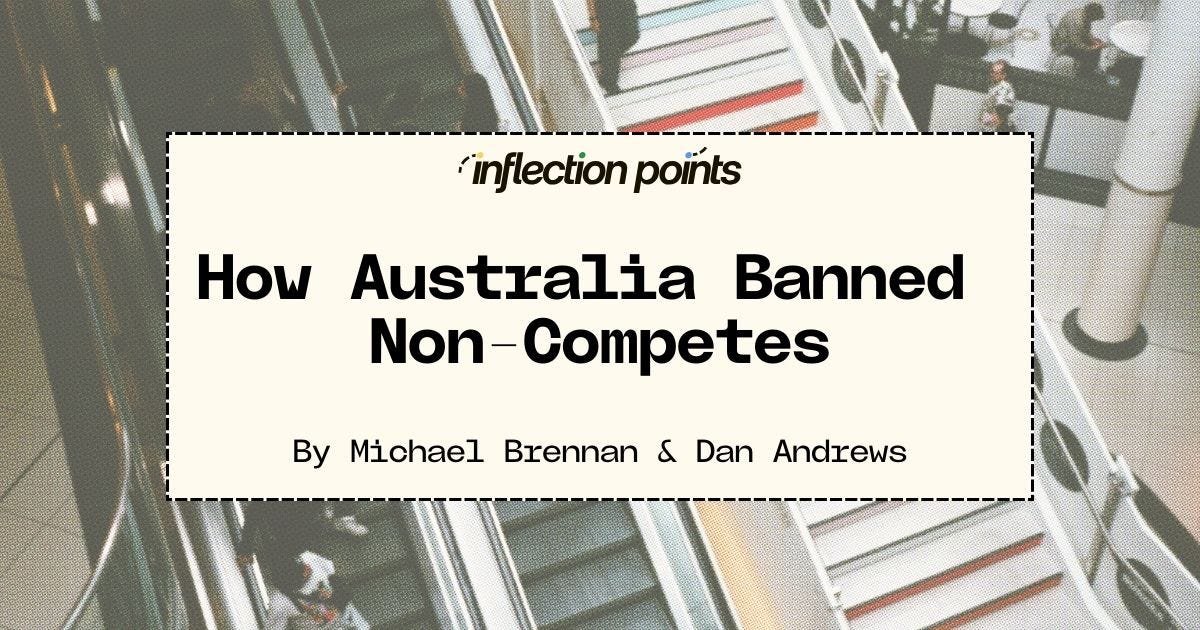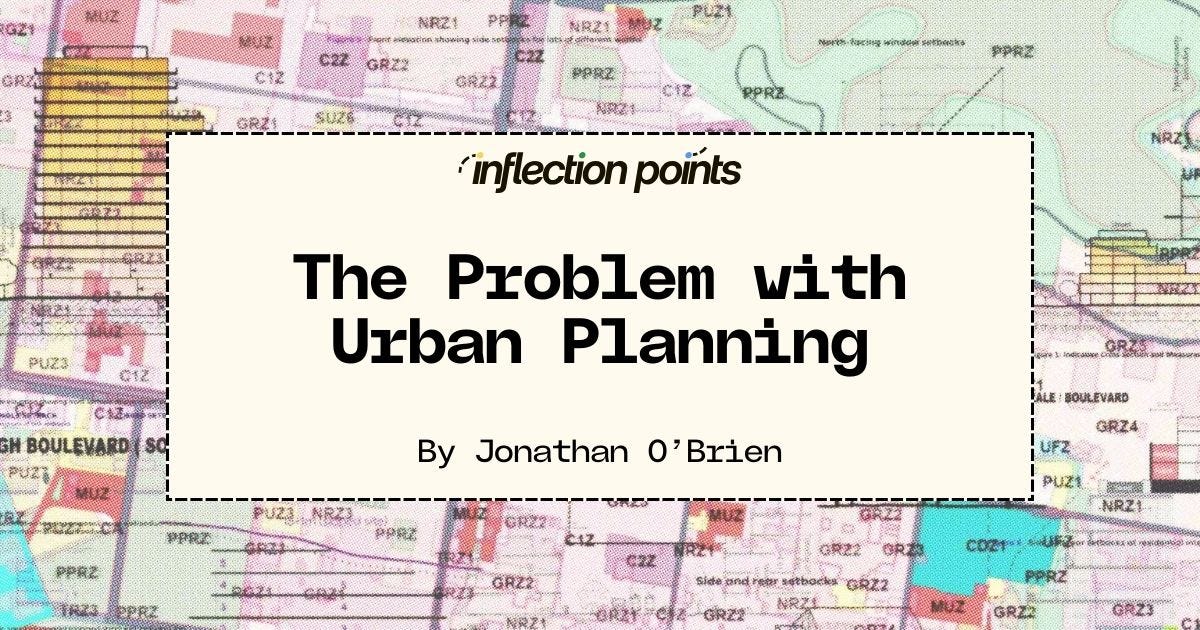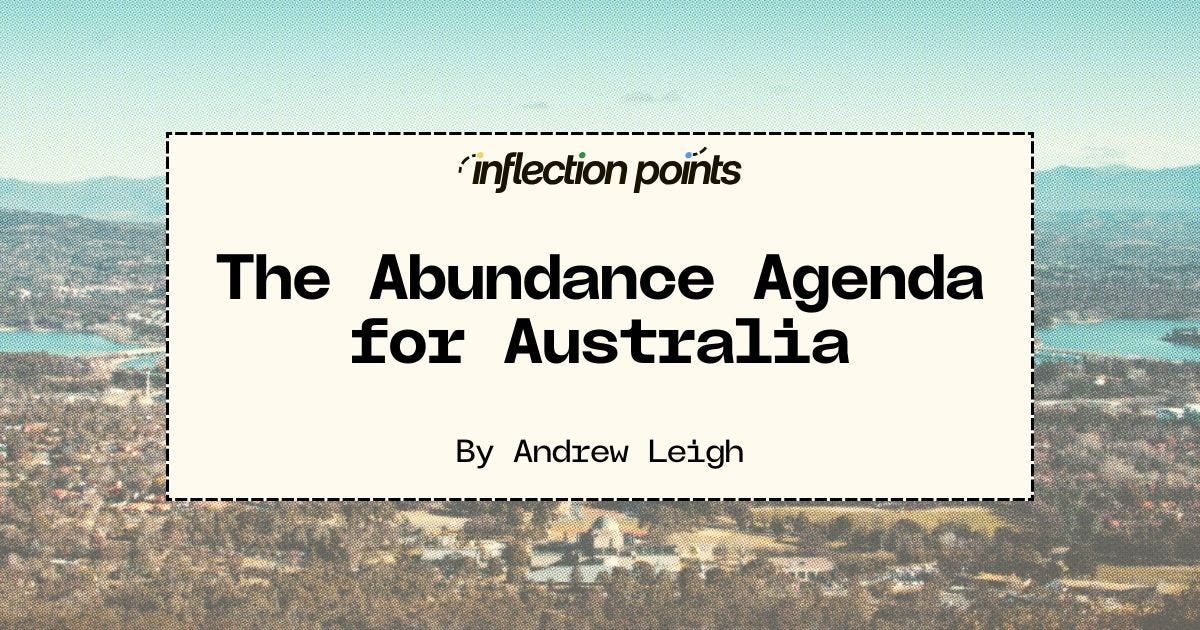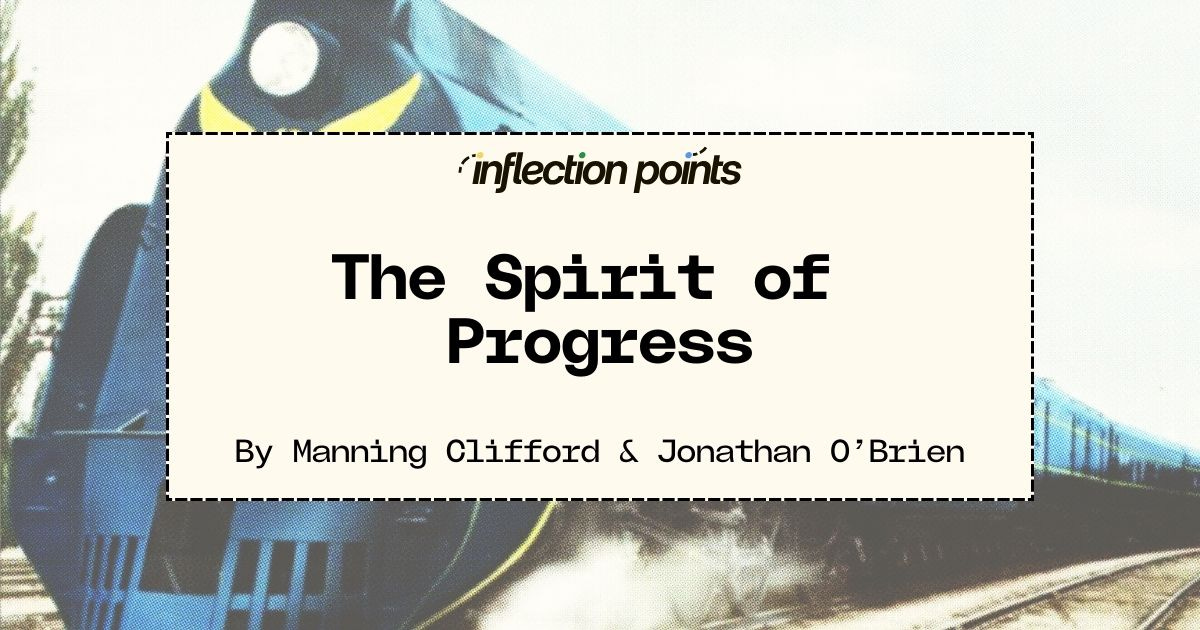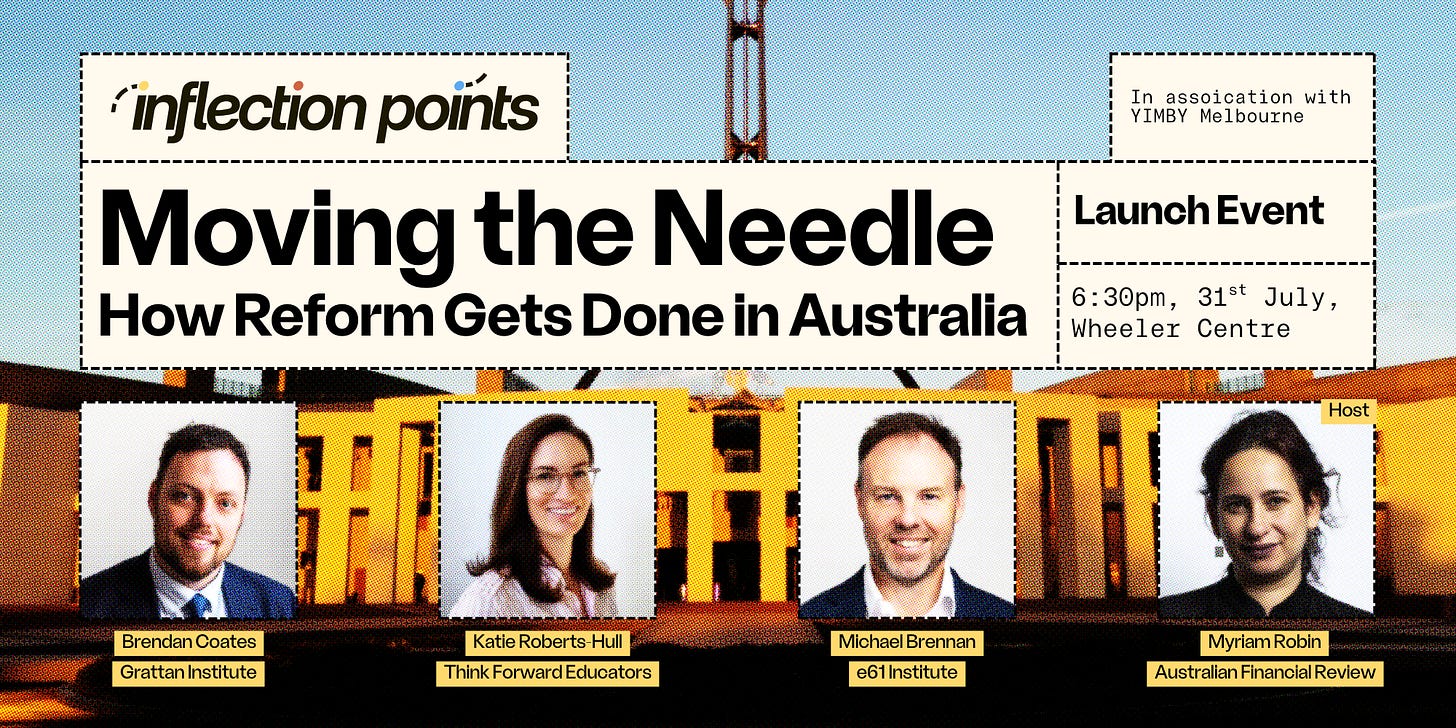Issue 01: Welcome to Inflection Points
Today we launch our first issue, free for all to read.
Welcome to Inflection Points, the new home of quality Australian long-form policy writing.
Australia is full of smart, thoughtful people who care about reform. But too often, the conversation stops at talk. Inflection Points exists to push things further, by commissioning and publishing long-form pieces about the ideas, institutions, and reforms that could shape our future.
Through this newsletter, we’ll be sharing new editions of Inflection Points when they are released on our website, alongside some of the best content from our platform. We’ll also keep you updated with events and other happenings from the Inflection Points team.
Issue 1 is out now
We’ve released issue 1 of Inflection Points. It contains four excellent essays grappling with different elements of Australian reform. The pieces are:
How Australia Banned Non-Competes by Michael Brennan and Dan Andrews
The Price Children Pay for Exclusive Suburbs by Katie Roberts-Hull
The Problem with Urban Planning by Jonathan O’Brien
The Abundance Agenda for Australia by Andrew Leigh
We’ve compiled brief summaries of each of these pieces below.
How Australia Banned Non-Competes by Michael Brennan and Dan Andrews
Michael Brennan and Dan Andrews from e61 Institute tells the story of how non-compete clauses (NCCs) and other post-employment restrictions went from being an obscure topic to the subject of a major federal government reform in just three years.
In 2022 the evidence base against non-compete clauses was building internationally, such as in the United States, but Australia was left on the back foot. We didn't have the research nor the data on the effects on these clauses on our workforce.
Research by the e61 Institute and the ABS found that non-competes (and other post-employment restrictions) were prevalent across a wide spectrum of Australia’s labour market.
This research, and broader collaboration, culminated in the government's 2025-26 Budget announcement of a ban on NCCs for workers earning under $175,000.
Their essay shares how this evidence-based approach can be seen as an optimistic and replicable model for achieving meaningful policy reform in other areas.
The Price Children Pay for Exclusive Suburbs by Katie Roberts Hull
Katie Roberts-Hull, CEO of Think Forward Educators, explores how Australia’s restrictive housing policies deepen educational inequality.
Where children live critically shapes their life outcomes, and that rising housing costs are isolating lower-income families in fringe suburbs with fewer services, weaker school infrastructure, and limited social mobility.
Drawing on international research Roberts-Hull shows how neighbourhoods rich in “economic connectedness” support better outcomes for disadvantaged students.
But planning restrictions across Australia prevent more families from accessing such communities.
Affluent inner-city areas are losing children due to restricted housing supply, leading to under-enrolled schools with shrinking resources.
Equitable education requires reforming planning rules to promote integration. By legalising diverse housing choices in established suburbs and prioritising school infrastructure, Australia can open up opportunities across postcodes and ensure every child has access to great educational outcomes regardless of how wealthy their parents are.
The Problem with Urban Planning by Jonathan O’Brien
Jonathan O’Brien argues that Australia’s planning failures stem not only from local political opposition, but also from the professional planning system itself.
Since 1986, the number of planners in Australia has grown nearly ninefold, while housing approvals per planner have dropped from over 50 to fewer than 9.
Despite this, the sector claims to face a planner shortage. O’Brien suggests the issue is an excess of process.
The essay lays out how planning became an insulated profession, poorly integrated with the rest of government, and too focused on regulation rather than coordination.
O'Brien proposes that planning should be made more accountable to government; that it should shift focus from regulating private land to improving the connectivity and amenity of the public realm; and that reform should empower a new generation of planners to work iteratively and measurably, using modern tools to better support housing, infrastructure, and energy delivery.
Abundance for Australia by Andrew Leigh
Andrew Leigh, Australia’s Assistant Minister for Productivity, Competition, Charities and Treasury, lays out the case for an Australian abundance movement. He reflects on how the 2025 book Abundance by Ezra Klein and Derek Thompson applies to an Australian context.
Leigh diagnoses many of the the challenges faced by Australia today as being put down to scarcity:
Canberra built fewer houses in 2024 than it did in 1964, despite today’s population being nearly five times the size.
Australia’s construction productivity has fallen by 12 percent over the last 30 years, despite growth across most other sectors of the economy.
Australia’s rail construction costs per mile are roughly double the cost of well-paid economies like Sweden.
Many Australian academics now spend more time managing approvals than on pursuing their research.
Leigh proposes five solutions to these problems:
To focus on throughput, rather than on oversight.
To align planning and delivery through a less fragmented approvals process.
To remove choke-points and duplication from high-value processes.
To build confidence in Australia's institutional systems.
Finally, to reward delivery of outcomes over announcements.
Opening editorial
In addition to the essays in our first issue, we’ve also released our opening editorial. The Spirit of Progress is authored by our leadership team (Manning Clifford & Jonathan O'Brien) and outlines our editorial view through a story of hard-fought reform.
We examine one of Australia’s longest-running institutional failures: railway gauge incompatibility. Different railway gauges across Australian states led to countless hours of wasted time, as passengers and freight were required to change vehicles at state borders. It would take over a century for railway gauges to be standardised across Australia, leaving us lagging behind the world (so much so that Mark Twain, when writing about Australia, lamented the “paralysis of intellect that gave that idea birth”).
At the center of the story of standardisation is Harold Clapp, a reforming public servant who transformed Victoria’s railways in the early 20th century. Despite launching world-class infrastructure across Victoria, Clapp’s efforts were stymied at the New South Wales border due to incompatible track gauges. Appointed Director-General of Land Transport during World War II, Clapp used the moment of national crisis to push for reform. His 1945 report proposed a coordinated national investment in standard gauge rail, laying the groundwork for the seamless east–west network we rely on today.
In Clapp’s efforts is a lesson: that progress requires clear vision, selfless advocacy, and a willingness to act decisively. His story tells us why good reform so often takes time, shows what’s required to make it happen, and informs how Inflection Points hopes to play a role. In the conclusion of the piece, we outline our editorial vision for Inflection Points and why the dotted-lines used so heavily in our publication serve to inspire us for a better future.
Our Melbourne launch
We’ll be hosting our launch event, Moving the needle - how reform gets done in Australia, at 6:30pm on 31 July at the Wheeler Center in the State Library of Victoria. You can get tickets here.
The event will be hosted by Myriam Robin and feature a panel of Brendan Coates, Katie Roberts-Hull and Michael Brennan. Each of these speakers will be reflecting on their experience of enacting reform in an Australian context.
After the event, the Inflection Points editorial team will be hosting casual drinks (Inflection Pints!) at the Moat. We’re looking forward to meeting a broad and diverse group of Australians who are interested in advancing reform.
Reform begins with ideas; and we hope you’ll help us share them. If you think someone you know would enjoy Inflection Points, please forward this email or direct them to our website.
– The Inflection Points Team



